 |
| by Mark
Steele - Auckland, New Zealand
A trio to
rave about, Kerfuffling and Kerplonkin,
a man on my mission,
and an Alden schooner to die for!
|
Three lovely sailing works of art above, indeed a
trio for readers to do a rave-up on and start this
September column. Above, left is Roy Lake of Auckland
with his multi-mast schooner, above, right Cornwall’s
Ken Impey with this fine looking schooner. Below,
US sailor, Maryland’s Alan Suydam with his model
of the famous schooner Brilliant.
Windling is about fun and friendship, relaxation
and humour. The book of windling even suggests the
use of humorous terminology for various moves both
pondside and on the water. Become becalmed and you
might just hear the word kerfuffling, slam into the
wall and you might be labelled a Harvey Bow-Banger,
with the action described as a ‘Wall-Do., Lose
your steering and your yacht is out of control and
you’re triangling (next stop Bermuda!). There’s
more too. Those prone to ending up in the reeds are
Keen Reeders or Bushwackers, tangle with another boat
and both boats are octopussying while slamming heavily
into another boat can be described as kerplonkin!
Off the water, anyone who blocks the view of another
sailor is called a Full Back and a Fizzplonker is
one who charges about seemingly activity-loaded, regularly
taking his boat out looking for weed, then plonking
it back in again! There’s no glory or trophy
rewards in windling or casual model yacht sailing
so loosen up, relax, and laugh a little!
I have been on a personal mission for some years,
to relax while having fun with a few friends, at the
same time spreading enthusiasm for model sailing boats,
and their use non-competitively and purely for pleasure,
without taking the activity too seriously. (Put another
way, `taking seriously the art of not taking our boats,
ourselves and our sailing too seriously!’. Confused?
That’s alright, most of us are really!) One
example, about to enjoy a quiet sail is the writer,
seen `launching with intent’ his oldish ketch
Marigold in Auckland, New Zealand in the
photograph below.
I have found another 'man on a mission' with some
similarity, one John Storrow of Boston, Massachussetts
in the U.S.A.. The only difference with John is, that
unlike me (who has several thumbs which seem to get
fatter with the passing years), John can build stunning
sailing models, many of which he also designs. He
also lives for his model yachting and likes to enthuse
others.
Model yachting encompasses many many classes of boats
and types of sailing activities, I am sure you have
heard me say that before, and John (seen below) is
not afraid to experiment and expand the parameters
of design. He paints also (see one of his works below)
I was introduced to his work by Barry Gibson in Victoria,
Australia and did a story on Storrow many years ago
in my Windling World magazine.
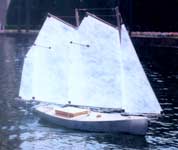 |
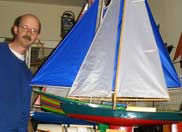
|
I wrote in an earlier issue that modelling is also
very much about people and I’d like to tell
you about Charlie Roden (seen below) of New Jersey
which I am told is about fifty miles south of New
York City. Charlie who belongs to the Marbleheaders
Model Yacht Club of Spring Lake, NJ and Walter Watkins,
built 50” (on deck) models of a 1931 Aux cruising
schooner named Grenadier designed by that
famous naval architect, John Alden. Walter had purchased
the original plans from the Alden design office in
Boston and sold Charlie a copy to build a plank on
frame model using western red cedar 1/8” X ¾”
strips, the model built to the San Diego Schooner
Rules which require a faithful 50” scale model
of the original boat design. June Pandino took the
photos below of the model being sailed at Spring Lake
last year.
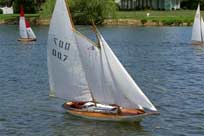 |
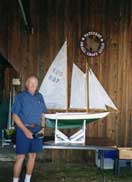
|
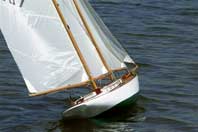 |
Charlie who attended the 1952 Massachusetts Maritime
Academy and was in the United States Navy does a mentoring
class of ten boys and two girls at the Calvert Museum
in Maryland where the youth are building skipjack
models
If you have one (or want one and can get it –
there must be many gathering cobwebs in attics and
garages), here is what you can do with an old and
no longer used Marblehead or A Class hull that has
passed it’s use by date for being raced competitively
because of design and method of construction limitations
when built.. Bob Walters of Auckland’s Ancient
Mariners windling group, converted one into a kind
of`Superyacht, Passing Cloud shown here.
Don’t throw them away, make something new with
their hulls.`Nautical sin-bin style boats’ are
in fashion and get bigger and more popular among the
rich and famous as cruising boats don’t they.
There is also a scale group at Fleetwood in UK who
convert old RM hulls into great looking schooners.
Now there you go! That’s another idea I will
tell you about if and when my friend Jim Bennett of
the Fleetwood Model Yacht & Power Boat Club sends
me some photos, until then here are two impressive
schooners built up on older no longer used hulls.
|
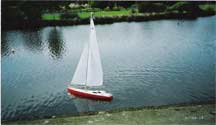
Left - Bob Walters' Passing Cloud; above - Ron
Rule's RM cruising boat; below - one of the
Fleetwood RM-hulled schooners.
|
Back to those wonderful little crew figures that
Hans Staal of the Netherlands makes for his sailing
models. In the first photograph five nicely featured
heads made out of a modeling compounds await the intricate
painting process as seen in the second photograph,
while in the third photograph, the crew on the sands
and aboard the Garnelenschuit await the tide that
will float them and take them out to the fishing grounds.
The time and effort in modelling and painting the
tiny figures `maketh the men !’.
There’s a rather nice looking cutter-rigged
sloop designed like a working Pilot boat, the Ruby
B put out in kit form by Victor
Model Products of Downey in California.
It will cost you around three hundred greenbacks but
when you have built it and made a good job of its
construction and finishing (remember, if you rush
it you ruin it) you will have a model that will sail
well and be much admired. Go to the website
and check it out, but first look at these two photos
below.
|
|
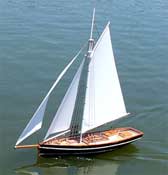
|
The Lawhill was a steel-hulled four-masted
barque built in Scotland and launched in 1892 that
was ordered for the jute trade. After only just a
couple of voyages carrying jute because of a fall
off on that trade she carried other cargoes including
grain. After twenty years as a grain carrier, the
ship was seized by South Africa and confiscated as
a prize of war and eventually sold to a firm in Lourenco
Marques where she rotted at anchor in a river there
for many years and was finally broken up for scrap
in the 1960s. During her sailing years she was photographed
on one occasion going into Durban. I found the photo
(below) on the internet and it is reproduced below
at left - kind courtesy of Allan at Media Group and
is credited to fad.co.za
|
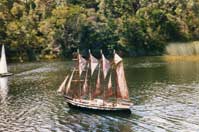
|
Ship modeller, Ron Fox who also built and runs a
garden railway at his home in Buddina, Queensland,
Australia was attracted to the boat and built this
fine RC model (above) which he enjoys sailing. Perhaps
he was attracted to the Lawhill because of a further
connection the ship had with Australia. Apart from
carrying grain from there I seem to recall reading
whatever it was somewhere but I’ll be dammed
if I can remember what it was and where I read it.
If I am wrong then I profusely apologise. Not a good
place to end this months ramble methinks …apologizing
while lost at sea somewhere in the Ocean of Forgetfulness?
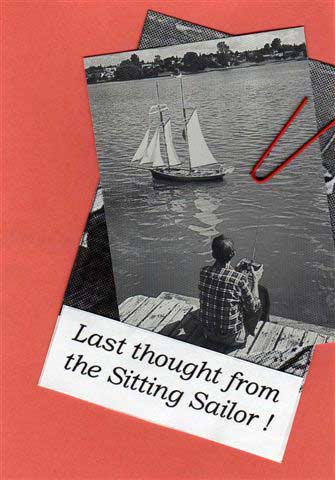
`Few would disagree
that the world
of sailing is both wide and varied
insofar as what one sails, and how
one uses available wind power’

For
previous columns by Mark Steele, click here

|